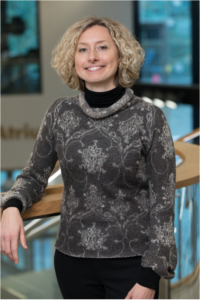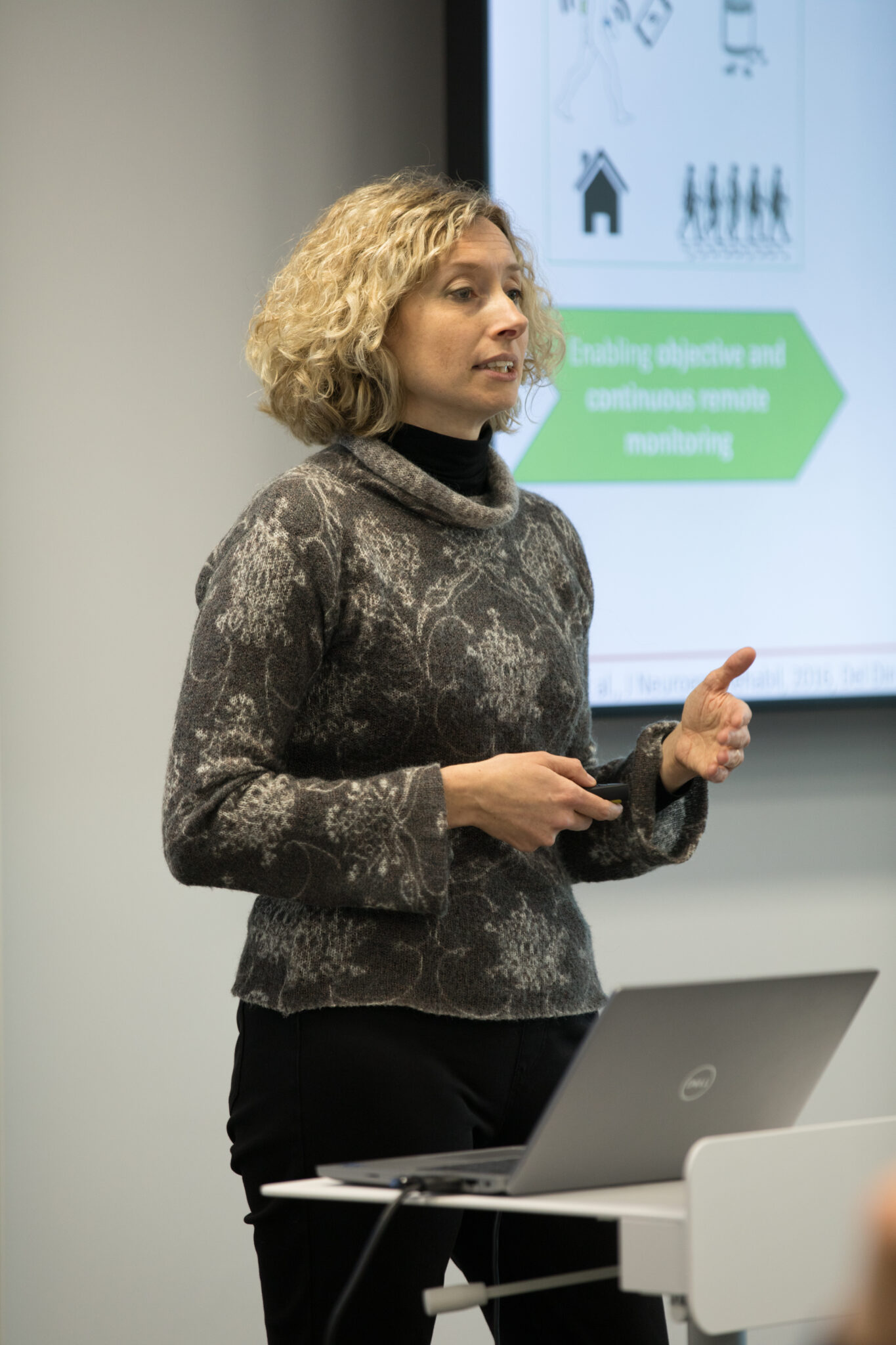An interview with Dr. Silvia Del Din , Bioengineering & neurodegenerative diseases on September 20, 2023 by George Ackerman, Ph.D, J.D.

Biography
I am Dr Silvia Del Din. I have received my Bachelor’s Degree in Information Engineering in 2006 and my Master’s Degree (cum laude) in Bioengineering in 2008 from the University of Padova, Italy.
In 2012 I completed my PhD in Bioengineering (Area of the Information Engineering PhD School) at the Department of Information Engineering of the University of Padova, under the supervision of Prof. Chiara Dalla Man (“Innovative Techniques for Biomechanical Evaluation of Stroke Survivors: Combined fMRI-Gait Analysis Assessment and Fugl-Meyer Clinical Scores Estimation Through Wearable Sensors.”).
I spent part of my PhD at Harvard Medical School (Spaulding Rehabilitation Hospital) under the supervision of Prof Paolo Bonato, looking at using wearable technology for estimating clinical scores in post-stroke patients.
I joined Newcastle University in 2012 and I am a Newcastle university Academic Track (NUAcT) Fellow, working with the Brain and Movement (BAM) research group.
My expertise and translational research interests focus on digital health applied to neurodegenerative diseases, especially Parkinson’s.
My research aims at innovating digital healthcare by using wearable sensors and developing analytics to enable remote patient monitoring and management.
Please tell me a little about your background.
My background is in bioengineering, I have always been passionate about using technology and analyzing biomedical signals to help people and for the past 10+ years I focused on helping people with Parkinson’s.
Can you tell me more about your advocacy?
My advocacy involves sharing my research and new insights on Parkinson’s on social media platforms (e.g., twitter, LinkedIn), presenting my work on Parkinson’s research at national and international conferences and sharing awareness via Patient and Public Involvement and Engagement (PPIE) activities.
What is your passion and how did you get involved in Parkinson’s awareness and hope for a cure?
My passion is helping people and trying to make a difference in people’s lives. I got involved in Parkinson’s awareness via my research, meeting and getting to know people with Parkinson’s who participated in our projects at the Clinical Ageing Research Unit.
My vision aims to develop an integrated wearable multi-component system for remote monitoring of medication adherence and mobility/motor impairments in people with Parkinson’s disease.
I want to develop an integrated system of digital tools (using smartphones software, a smartwatch and a body worn wearable technology) to objectively and continuously monitor people with Parkinson’s by evaluating medication adherence and mobility outcomes.
My long-term vision is to create a system that in the future could, in real-time, collect information and deliver actionable feedback to people with Parkinson’s to help them managing their symptoms and ultimately improve their quality of life. The project is truly multidisciplinary, involving clinicians, physiotherapists, biomechanists, engineers, data scientists.
I hope that this project is the first step towards making a difference for people with Parkinson’s.
If you are curious this is a short video of my vision:
Video link: https://www.youtube.com/watch?v=CpUpVp1myhg
Project reference: ISRCTN Number: 13156149: https://www.isrctn.com/ISRCTN13156149
What type of goals do individuals with Parkinson’s have when seeing your advocacy?
People with Parkinson’s are great at participating in research, they are committed to find ways to better understand their condition and to find solutions that can improve their quality of life and they really understand the importance of research.
What type of training and how long are the programs?
I don’t provide training specifically, but when participants sign up for research projects, they come along to the Clinical Ageing Research Unit Facilities (e.g. we have a Gait laboratory) and get assessed in sessions that can last 1 or 2 hours. We use a plethora of clinical tests (e.g., UPDRS), mobility tests (to better understand how they walk), balance tests and cognitive tests to advance our knowledge of Parkinson’s and find new solution to improve their mobility and quality of life.
What effect can your advocacy have on an individual with Parkinson’s?
My aim is to allow people with Parkinson’s to have a batter quality of life, to better understand how we can improve their mobility and manage their medication adherence.
As part of my research we have launched a survey to better understand how medication adherence can impact their lives (please see flyer attached and link: https://newcastle.onlinesurveys.ac.uk/pd-med-tools, the survey is open until the end of September).
My long-term vision is to create a system that in the future could, in real-time, collect information and deliver actionable feedback to people with Parkinson’s to help them managing their symptoms and ultimately improve their quality of life. I hope that this project is the first step towards making a difference for people with Parkinson’s.
What would you like to see as a future goal for your advocacy?
I would like people with Parkinson’s to have a platform where they can provide feedback and ideas to better their lives so that researchers can implement them and trying to find solutions.
What events do you participate in?
National and international conferences (ISPGR, BioMedEng, MDS, ICAMPAM) and PPIE events (also with local Parkinson’s groups), also events like European Researchers Night and other events for the lay public.
How does your advocacy also assist caregivers?
We have done research to better understand the interplay between people with Parkinson’s and their caregivers and which aspects may be impacted by this (e.g. activity, psychological factors), so caregivers are also at the center of our research and interest.
How can someone get in touch? What is your website?
This is the website with all information to get in touch with me: https://www.ncl.ac.uk/medical-sciences/people/profile/silviadel-din.html
The Brain and Movement Research Group website also can be useful: https://www.bam-ncl.co.uk/
Twitter – Silvia Del Din: @sil_bam
How can others also become advocates for awareness?
I think participating to events organized for example by Parkinson’s UK or other local groups like for example the Northeast and Cumbria Local Parkinson’s Excellence Network could be an eyeopener and get people involved in being advocates for awareness.
If you had one final statement or quote you could leave for the Parkinson’s community, what would it be?
I have always loved this quote by Vivian Greene: “Life isn’t about waiting for the storm to pass… It’s about learning to dance in the rain.”

